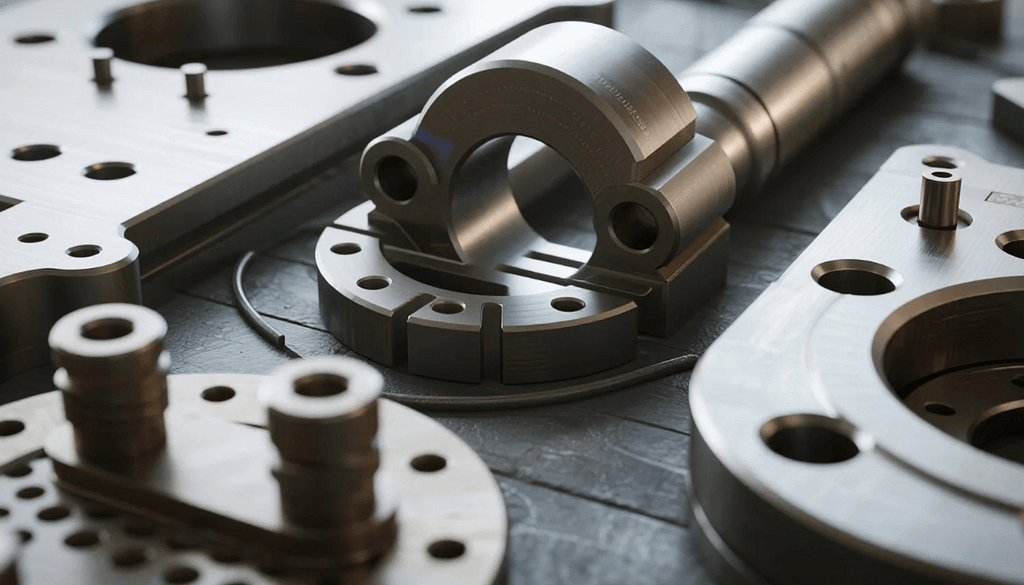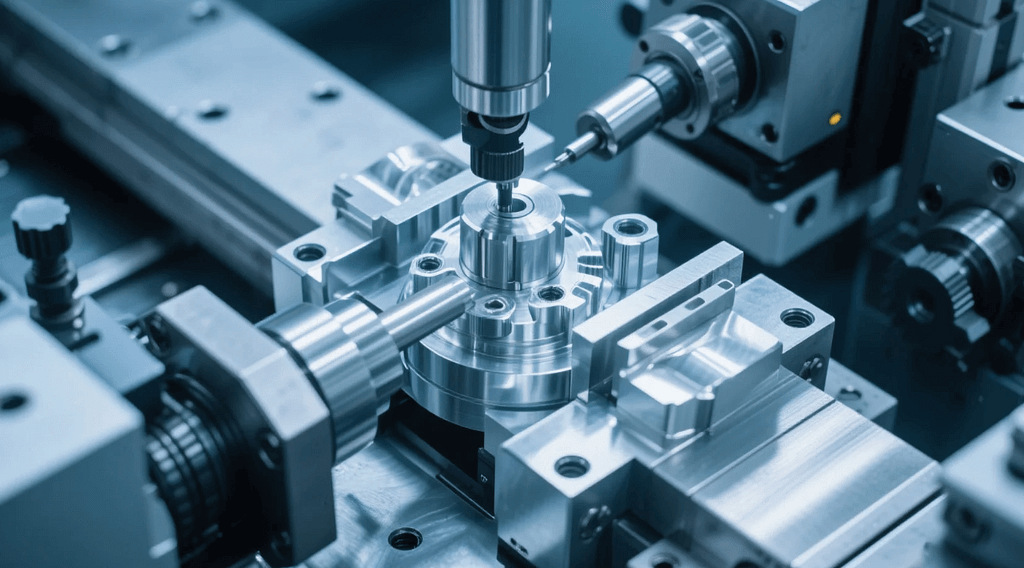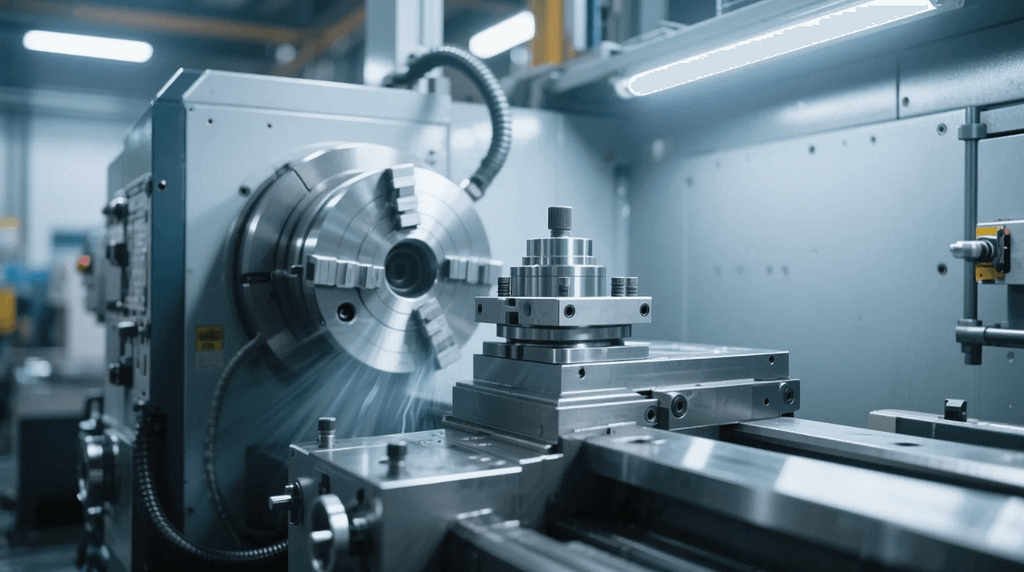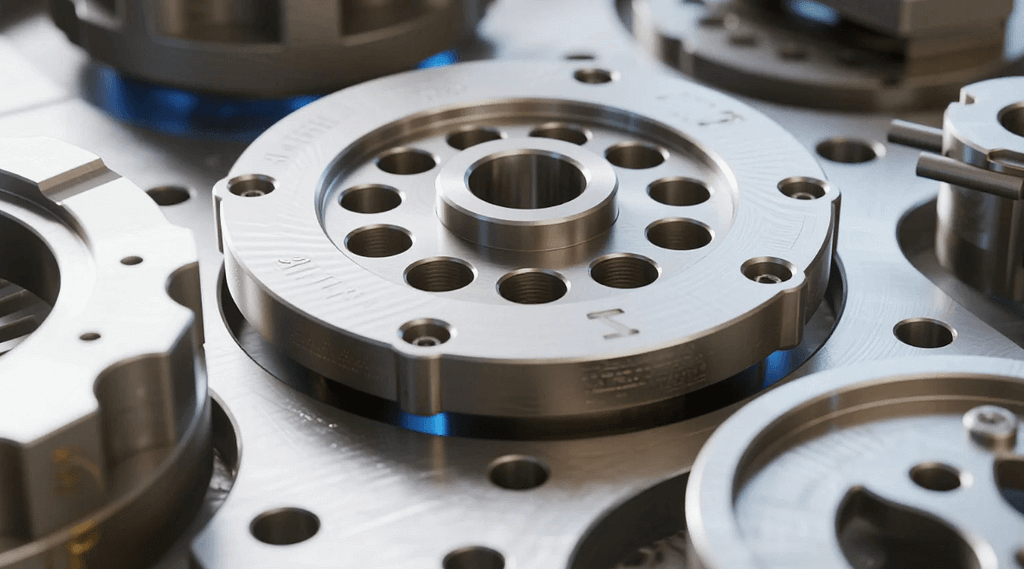In the competitive landscape of advanced manufacturing, the difference between a good product and an exceptional one often comes down to accuracy. For industries demanding the highest standards, from intricate medical devices to critical aerospace components, precision CNC machining stands out as the indispensable process. This sophisticated manufacturing method harnesses the power of computer numerical control to produce parts with exceptionally tight tolerances, superior surface finishes, and unwavering repeatability. This article delves into the core of precision CNC machining, highlighting its unique features and its profound impact on creating high-fidelity industrial models. For businesses, like CAPtec, that require highly accurate prototypes and functional models, understanding the capabilities of a dedicated precision CNC machining provider is essential for accelerating innovation and ensuring product excellence.
Defining Precision CNC Machining
At its heart, precision CNC machining refers to the use of highly accurate, computer-controlled machine tools to remove material from a workpiece, producing components with extremely tight dimensional tolerances and superior surface finishes. It’s a specialized form of subtractive manufacturing that pushes the boundaries of accuracy far beyond what standard CNC machining can achieve, often operating at tolerances measured in microns (one-thousandth of a millimeter) or even smaller. This level of meticulousness is crucial in sectors where even microscopic deviations can significantly compromise performance, safety, or functionality, making it the preferred method for mission-critical parts and prototypes.
The Pillars of Unrivaled Accuracy

Achieving the level of quality found in precision CNC machining requires a combination of cutting-edge technology, advanced processes, and expert knowledge.
Unwavering Dimensional Accuracy and Repeatability
The defining characteristic of precision CNC machining is its ability to consistently hold exceptionally tight dimensional tolerances. This means producing parts that adhere exactly to specified dimensions, with minimal deviation from the CAD model. This remarkable accuracy is achieved through:
- High-Resolution Encoders and Feedback Systems: These systems continuously monitor the position of the cutting tool and the workpiece, making real-time adjustments to ensure the machine precisely follows the programmed tool path.
- Rigid Machine Structures: Precision CNC machines are built with extremely robust and heavy frames that minimize vibration and thermal distortion, both of which can compromise accuracy.
- Thermal Compensation: Advanced machines incorporate sensors and software that predict and compensate for thermal expansion or contraction of materials and machine components, maintaining accuracy across varying temperatures.
- Multi-Axis Capabilities: Multi-axis (e.g., 5-axis, 7-axis) CNC machines can machine complex geometries in a single setup, eliminating errors associated with repositioning the part and maximizing overall precision.
Superior Surface Finishes and Integrity
Beyond dimensional exactness, precision CNC machining consistently delivers remarkably smooth and consistent surface finishes. This is critical for parts where aesthetics, functional friction, or fluid dynamics are important, or where any surface imperfection could lead to premature failure. Achieving these fine finishes involves:
- Optimized Tool Paths and Cutting Parameters: Specialized CAM software generates highly efficient tool paths, and expert machinists fine-tune parameters like spindle speed, feed rate, and depth of cut to minimize tool marks and achieve a mirror-like finish.
- High-Performance Cutting Tools: Utilizing specialized tooling materials (e.g., carbide, ceramic, diamond-tipped) and geometries designed for specific materials and finishes.
- Advanced Coolant Systems: Precisely directed and high-pressure coolants manage heat generation and efficiently remove chips, preventing material re-cutting and surface damage.
- Subsurface Material Integrity: The machining process is carefully controlled to avoid inducing micro-cracks or altering the material’s internal structure, which is crucial for the long-term performance and fatigue life of critical components.
Advanced Machine Tools and Technology
The equipment used in precision CNC machining represents the pinnacle of manufacturing technology. This includes not only multi-axis milling and turning centers but also specialized machines like Electrical Discharge Machining (EDM) for intricate cuts in hard materials, and precision grinding machines for ultra-fine finishes. These machines often feature automated tool changers, in-machine probing for automated measurement, and sophisticated software for complex programming and simulation.
Expert Knowledge and Craftsmanship
While machines are automated, precision CNC machining heavily relies on the deep expertise of skilled machinists, engineers, and programmers. Their ability to interpret complex engineering drawings, select optimal cutting tools and parameters, create intricate G-code programs, and monitor processes is paramount. This human element ensures that the advanced capabilities of the machines are fully leveraged, transforming digital designs into physical components with exceptional accuracy and integrity.
Material Versatility for Demanding Applications
Precision CNC machining works with an extensive range of materials, including challenging aerospace alloys, medical-grade plastics, high-performance ceramics, and exotic metals. Experts understand how each material behaves under cutting stress, ensuring optimal processing to achieve the desired precision and integrity without compromising the material’s inherent properties. This versatility allows the creation of components for highly specialized environments.
The Indispensable Role of Precision CNC Machining in Industrial Model Applications

For companies, like CAPtec, that provide and utilize precision industrial model services, precision CNC machining is not merely a manufacturing method; it is the cornerstone of their ability to deliver high-fidelity prototypes and functional models.
Validating Design Intent: Form, Fit, and Function with Unmatched Accuracy
One of the primary applications of precision CNC machining in industrial modeling is to create physically accurate representations for comprehensive form, fit, and function validation. Before committing to expensive tooling for mass production, businesses critically need to physically interact with a model to assess its aesthetics, ergonomic qualities, and how its components fit together and operate.
For example, an automotive engineer might require a precisely machined prototype of a new transmission housing to verify clearances with internal gears and shafts. A medical device firm could need a highly accurate model of a surgical implant to ensure its exact fit within a bone structure. In both scenarios, the absolute accuracy provided by precision CNC machining is indispensable. It eliminates guesswork, allowing designers and engineers to identify potential issues early in the design cycle, significantly reducing costly rework and delays later in the product development pipeline.
Enhancing Visual Prototypes and Marketing Tools
Beyond pure functional validation, precision CNC machining is also instrumental in producing visually stunning prototypes for marketing, investor presentations, and product launch events. The superior surface finishes and intricate detailing possible with this technology ensure that models not only convey the design’s functionality but also its aesthetic appeal and premium quality. A pristine, precisely machined model can capture the essence of a product in a way that mere 3D renders often cannot, creating a powerful and lasting impact on potential clients or stakeholders. This helps businesses showcase their innovations with confidence and clarity, truly bringing the design to life.
Rigorous Functional Testing and Performance Validation
For many industrial models, the purpose extends beyond visual representation to rigorous functional testing under simulated operational conditions. Precision CNC machining allows for the creation of models that can withstand specific physical stresses, temperature variations, and operational forces, accurately mimicking the behavior of the final product.
Consider a company developing a new aerospace actuator. They might require a precision-machined prototype to test its response time and load-bearing capacity under extreme temperatures. The accuracy of the machined parts ensures that the test results are reliable and truly reflective of the final product’s performance. This level of comprehensive validation is invaluable for ensuring product reliability, safety, and reducing costly post-launch failures.
Accelerating Product Development Cycles
The ability of precision CNC machining to rapidly produce highly accurate and functional prototypes significantly shortens the overall product development timeline. Designers and engineers can quickly iterate on designs, moving from concept to physical model in a fraction of the time compared to less precise or traditional methods. This accelerated cycle allows for more frequent design revisions, faster feedback loops, and ultimately, a more refined and optimized final product reaching the market sooner. It truly streamlines the journey from idea to realization.
Partnering for Excellence: Choosing a Precision CNC Machining Service

For clients seeking precision CNC machining services for their industrial models, selecting the right partner is a critical decision that directly impacts project success. Companies like CAPtec embody these crucial characteristics.
Proven Expertise and Experience
Seek a service provider with a strong track record and extensive experience in precision CNC machining, particularly with materials and complexities similar to your project. Their technical expertise, understanding of Design for Manufacturability (DFM), and problem-solving capabilities are invaluable for navigating challenges.
State-of-the-Art Equipment
Ensure the service utilizes modern, high-precision multi-axis CNC machines, advanced metrology equipment for verification, and robust quality control systems. The quality and sophistication of their equipment directly translate to the precision and consistency of the parts they produce.
Comprehensive Quality Assurance and Certifications
A reputable precision CNC machining service will have stringent quality management systems in place, often backed by internationally recognized certifications like ISO 9001 and industry-specific standards (e.g., AS9100 for aerospace, ISO 13485 for medical). This demonstrated commitment to quality ensures reliable and consistent results for every component.
Collaborative Approach and Transparent Communication
A strong partner offers clear communication channels and works collaboratively with your design team. Their willingness to provide DFM feedback, offer insightful material recommendations, and provide support throughout the prototyping and production phases is a key indicator of a valuable long-term relationship.
The Future of Precision CNC Machining and Industrial Models
The landscape of precision CNC machining is in constant evolution, driven by advancements in automation, artificial intelligence, and new material science. We can anticipate even greater levels of automation, real-time process monitoring with predictive analytics, and the integration of machine learning algorithms to optimize cutting parameters for unparalleled accuracy and efficiency. New, harder materials and increasingly complex geometries will continue to push the boundaries of what is possible. For industrial models, this means even faster turnaround times, the ability to work with an even broader range of advanced materials, and the creation of models with previously unattainable levels of detail and functional accuracy, further blurring the lines between prototype and final product. The ongoing commitment to ethical practices, safety, and environmental responsibility will continue to guide these transformative advancements.
الخاتمة
Precision CNC machining is an indispensable cornerstone of modern manufacturing, delivering components with unparalleled accuracy and surface quality. For businesses seeking high-quality industrial model services, leveraging the power of precision CNC machining is not merely a choice but a strategic imperative. Its capacity to transform visionary designs into tangible, highly accurate, and functional prototypes is profoundly reshaping product development across diverse industries. By providing the means to validate designs, accelerate iteration, and ensure a premium finish, precision CNC machining plays a pivotal role in bringing innovative and successful products to market faster. As technology continues to advance, the capabilities of precision CNC machining will only grow, further solidifying its place at the forefront of engineering excellence.
الأسئلة الشائعة
Q1: What industries rely heavily on precision CNC machining?
A1: Industries such as aerospace, medical devices, automotive, defense, electronics, and tool & die manufacturing rely heavily on precision CNC machining due to its ability to produce highly accurate and reliable components.
Q2: What tolerances can precision CNC machining typically achieve?
A2: Precision CNC machining can consistently achieve very tight tolerances, often measured in microns (e.0025mm), significantly exceeding standard machining tolerances.
Q3: How does precision CNC machining benefit industrial model creation?
A3: It allows for the production of prototypes with exact dimensional accuracy, superior surface finishes, and production-like material properties, enabling rigorous functional testing and accurate design validation before mass production.
Q4: What types of materials can be processed with precision CNC machining?
Q4: A wide range of materials including various metals (e.g., aluminum, stainless steel, titanium, brass), engineering plastics (e.g., PEEK, Ultem, Delrin), composites, and even some ceramics can be precision CNC machined.
Q5: Is precision CNC machining cost-effective for high-volume production?
Q5: While it can be more expensive per part than very high-volume methods like injection molding, for complex parts or medium volumes where accuracy is paramount, precision CNC machining offers excellent cost-effectiveness by minimizing waste and post-processing needs.
Q6: What is the role of DFM (Design for Manufacturability) in precision CNC machining?
Q6: DFM is crucial. Experienced precision CNC machining providers work with designers to optimize part geometries, material choices, and features to ensure the part can be efficiently and accurately machined, reducing costs and lead times.
Q7: How does precision CNC machining contribute to product reliability and safety?
Q7: By consistently producing parts with ultra-tight tolerances and high material integrity, precision CNC machining ensures components perform exactly as designed, reducing the risk of failure and enhancing the overall reliability and safety of the final product, especially in critical applications.
